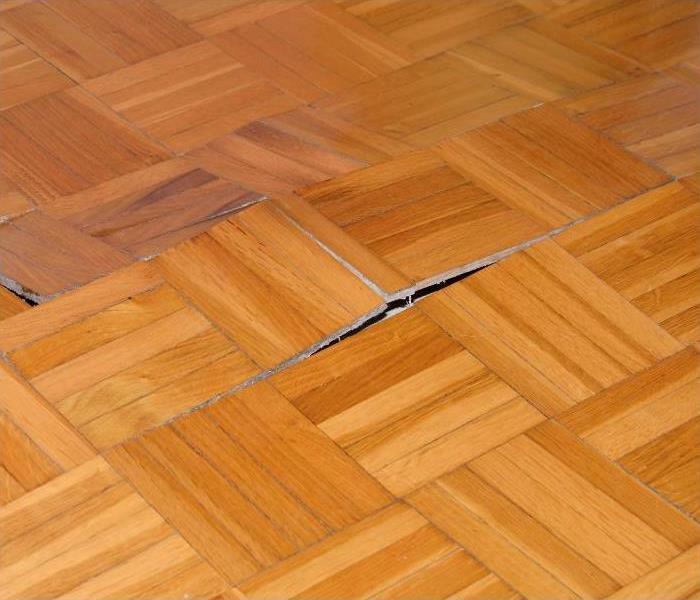Hardwood Floor Water Damage | Repair or Replace?
5/26/2021 (Permalink)
Hardwood flooring offers many advantages, but trouble begins when it comes in contact with water.
Time is one of the most significant factors when it comes to whether you should replace or repair your hardwood floors after water damage has occurred. The professionals at SERVPRO know the longer water remains on hardwood flooring, the greater the harm.
You need to act fast when it comes to hardwood floor water damage. If water has been soaking into the hardwood flooring for more than 24 hours, the likelihood of having to replace the entire floor is much higher.
This blog post will go over guidelines and observations on spotting, preventing, and minimizing water damage to your hardwood flooring.
What does hardwood floor water damage look like?
If your wood floor has been affected by water, you may notice single planks cupping or several planks crowning, giving them a hump appearance. When the wood absorbs water, it expands, causing them to buckle.
Another sign is staining, which will appear as discoloration spots on the hardwood flooring. On your hardwood flooring, you may notice white circles or black spots. Discoloration shows when a hardwood floor's finish has been moderately harmed as a result of moisture build-up.
4 signs of hardwood floor water damages
Water damage takes time to appear; by the time you notice something strange about your wood flooring, water damage has already occurred. Here are four common signs:
- Discoloration.
- Lifting Nails and planks.
- Mold growth.
- Cupping and moisture causing the hardwood to buckle.
3 Types of hardwood floor water damage
When it comes to repairing your hardwood floors, there are three distinct types of water to consider:
1) Clean water: Clean water damage is water that hasn't been contaminated. Clean water is safer to clean up and far less likely to hold bacteria that might cause mold development and bad odors. It is possible that the hardwood floors need to be replaced in a clean water damage situation.
2) Grey Water: Dishwashers and washing machines are the most common sources of this type. Demolition of hardwood floors that have had grey water damage is likely.
3) Black Water: Black water damage commonly contains sewage, generally caused by an overflowing toilet. Not only does black water smell bad, but it also carries hazardous bacteria. When black water comes in contact with hardwood floors for any amount of time, the hardwood floors will almost certainly need to be replaced.
What equipment is used for hardwood floor water damage?
Hardwood floor water damage needs to be handled by IICRC certified professionals. The goal of a water restorer will be to save the customer's hardwood flooring if possible. Water damage professionals will use drying techniques, including powerful high-end vacuums and air movers, to dry out the floor. Dehumidifiers will be strategically placed to remove all unwanted moisture in the air.
Call SERVPRO for hardwood floor water damage restoration
If you have hardwood floors in your home, then your biggest enemy is water. When a disaster occurs, our team at SERVPRO is 24/7 ready to mitigate any size damage.
Here at SERVPRO, we truly understand how devastating it can be to find your home in a water damage condition. We want to be your go-to contact to ease your worries.
SERVPRO of Downtown Atlanta is a renowned company, and it has been serving the customers in Atlanta since 1967. If you want that shiny hardwood flooring back, then SERVPRO is the most reliable option for you. Our team is fully equipped with advanced tools and has years of experience restoring water damages in Atlanta. Contact us, and we will turn your damaged house into your home again!




 24/7 Emergency Service
24/7 Emergency Service
